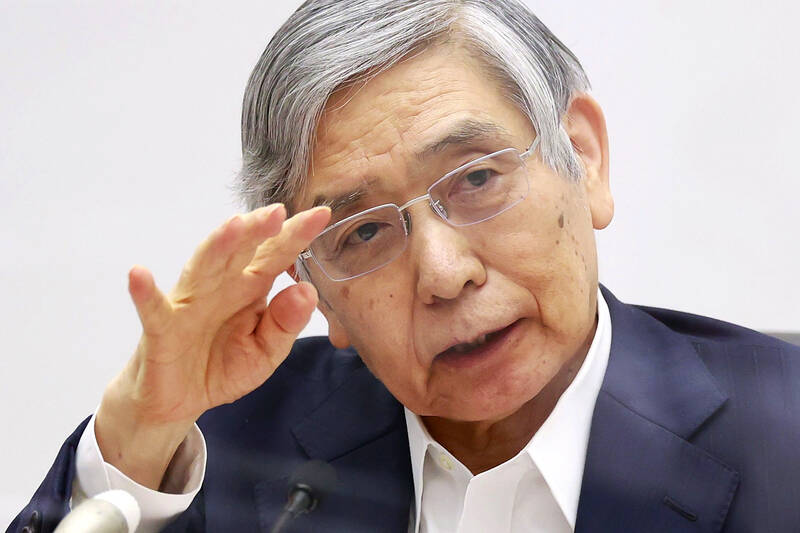Bank of Japan Governor Haruhiko Kuroda said that rapid yen moves are undesirable after a meeting with Japanese Prime Minister Fumio Kishida yesterday, joining a chorus of policymakers lobbing verbal warnings over the currency’s recent sharp drop to 24-year lows.
“Sharp currency moves are undesirable as they destabilize corporate business plans and heighten uncertainty,” Kuroda told reporters after the meeting, which he described as an occasional catch-up by the two sides to discuss broad economic and financial matters.
“When the yen is moving 2 to 3 yen per day, that’s a rapid move,” he added.

Photo: Bloomberg
The dollar jumped more than ¥2 on both Tuesday and Wednesday of this week, reaching ¥144.99 per US dollar — its highest since August 1998 — before stabilizing.
Kuroda’s remarks helped to knock the dollar to its biggest one-day drop against the yen in a month, although the US currency also retreated against other major currencies after a feverish climb in the dollar index to a 20-year high.
Japan’s currency is particularly vulnerable, while the Bank of Japan sticks to its policy of near-zero interest rates, focused on bolstering the economy while the central banks of other major developed economies hike rates to rein in inflation.
Verbal sabre-rattling is seen as one of the few viable near-term options for Japan to counter the yen’s marked weakness, which is boosting the cost of fuel and other vital imports.
“We will watch exchange rate moves carefully,” Kuroda told reporters after his meeting with Kishida.
While he discussed market developments including currency moves with the premier, he did not receive any specific policy requests, he said.
“By summoning Kuroda, the premier wanted to deliver a message that he is concerned about sharp yen falls,” said Makoto Noji, chief foreign exchange strategist at SMBC Nikko Securities.
“Both know all too well that the weak yen stemmed from broad dollar gains, which no one can resist,” he said. “While maintaining a fighting stance, Japan has no choice but to wait until the US tightening cycle comes to a halt, once it has cooled down the economy.”
The US dollar fell to ¥143.10 following Kuroda’s remarks, and extended that drop as far as ¥142.43. It was last down about 1 percent at ¥142.60.
“Kuroda’s remarks somewhat triggered the decline, which I suspect were likely caused by repositioning among retail foreign exchange investors and rebalancing of pension funds such as GPIF,” Noji added, referring to Japan’s Government Pension Investment Fund.
Prior to Kuroda’s remarks, Japanese Finance Minister Shunichi Suzuki on Friday said that the government would not rule out any options on foreign exchange moves, repeating a warning on Thursday by Japanese Vice Minister of Finance for International Masato Kanda, the country’s top currency diplomat.
“We’ve seen a rapid heightening of market volatility against the background of speculative moves,” Suzuki told reporters, adding that authorities were “very concerned.”

TEMPORARY TRUCE: China has made concessions to ease rare earth trade controls, among others, while Washington holds fire on a 100% tariff on all Chinese goods China is effectively suspending implementation of additional export controls on rare earth metals and terminating investigations targeting US companies in the semiconductor supply chain, the White House announced. The White House on Saturday issued a fact sheet outlining some details of the trade pact agreed to earlier in the week by US President Donald Trump and Chinese President Xi Jinping (習近平) that aimed to ease tensions between the world’s two largest economies. Under the deal, China is to issue general licenses valid for exports of rare earths, gallium, germanium, antimony and graphite “for the benefit of US end users and their suppliers

Dutch chipmaker Nexperia BV’s China unit yesterday said that it had established sufficient inventories of finished goods and works-in-progress, and that its supply chain remained secure and stable after its parent halted wafer supplies. The Dutch company suspended supplies of wafers to its Chinese assembly plant a week ago, calling it “a direct consequence of the local management’s recent failure to comply with the agreed contractual payment terms,” Reuters reported on Friday last week. Its China unit called Nexperia’s suspension “unilateral” and “extremely irresponsible,” adding that the Dutch parent’s claim about contractual payment was “misleading and highly deceptive,” according to a statement

Nissan Motor Co has agreed to sell its global headquarters in Yokohama for ¥97 billion (US$630 million) to a group sponsored by Taiwanese autoparts maker Minth Group (敏實集團), as the struggling automaker seeks to shore up its financial position. The acquisition is led by a special purchase company managed by KJR Management Ltd, a Japanese real-estate unit of private equity giant KKR & Co, people familiar with the matter said. KJR said it would act as asset manager together with Mizuho Real Estate Management Co. Nissan is undergoing a broad cost-cutting campaign by eliminating jobs and shuttering plants as it grapples

The Chinese government has issued guidance requiring new data center projects that have received any state funds to only use domestically made artificial intelligence (AI) chips, two sources familiar with the matter told Reuters. In recent weeks, Chinese regulatory authorities have ordered such data centers that are less than 30 percent complete to remove all installed foreign chips, or cancel plans to purchase them, while projects in a more advanced stage would be decided on a case-by-case basis, the sources said. The move could represent one of China’s most aggressive steps yet to eliminate foreign technology from its critical infrastructure amid a